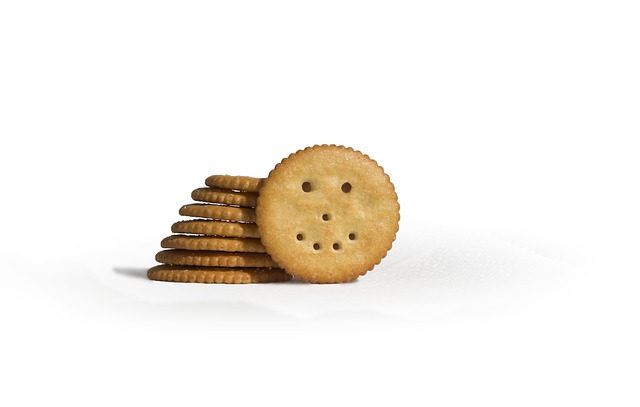Ritz Crackers are a well-known brand of snack crackers celebrated for their buttery texture and mildly sweet flavor. Initially introduced by Nabisco in 1934, these circular crackers have become a versatile household staple. People frequently use them to accompany various dips, spreads, and toppings.
Ritz Crackers are suitable for consumption alone or as a key ingredient in various sweet and savory recipes. They are often incorporated into pie crusts, casseroles, and appetizers, contributing a delightful richness and a satisfying crunch to numerous dishes and desserts. It is so tasty that people love eating it. But for dog owners, they want to extend it to their dogs as a yummy treat. The question is, can Border Collies eat the Ritz Crackers? It’s important to consider whether these crackers are safe and suitable for dogs.
Can Border Collies have Ritz crackers?

Border Collies and any other dogs, in general, can consume Ritz crackers in small quantities. It’s crucial to understand that these crackers do not provide substantial nutritional benefits for them.
Ritz crackers primarily consist of refined carbohydrates and salt, which do not align with the dietary needs of dogs. Offering Ritz crackers as a regular part of their diet is not recommended.
These crackers are relatively high in salt content, and dogs are much more sensitive to salt than humans. Excessive salt intake can lead to a condition known as salt poisoning or salt toxicity in dogs. Symptoms may include increased thirst, vomiting, diarrhea, lethargy, tremors, and seizures, which can even be life-threatening in severe cases.
To ensure the well-being of your dog, it’s essential to limit their intake of Ritz crackers to occasional treats and in minimal amounts. Moderation is crucial in avoiding potential health issues associated with excess salt consumption. Additionally, always ensure your dog has access to fresh water when offering them any snacks, including Ritz crackers, as water helps dilute the salt and aids in preventing dehydration.
Ritz Crackers Ingredients that are harmful to Border Collies
Ritz Crackers can lead to weight gain in dogs due to several ingredients. Dogs primarily require protein from meat and only need a small amount of carbohydrates daily for health. Adding more carbs to their diet, like those found in Ritz crackers (11 grams per serving), is unnecessary as most dog food brands provide sufficient carbohydrates.
Additionally, Ritz crackers contain salt (120 mg per serving), a necessary nutrient for dogs, but excess salt can make them excessively thirsty, leading to increased urination and potential dehydration. While fats in dogs do not cause high cholesterol as in humans, they are calorie-rich and can contribute to weight gain. Dog food typically contains adequate fat, and many dog treats are high in fats, so introducing Ritz crackers (2.5 grams of fat per serving) may lead to weight gain.
Surprisingly, Ritz crackers also contain sugar (2 grams per serving), which, when consumed excessively, can contribute to obesity and related health issues in dogs, including diabetes.
Simply speaking, it’s best to avoid giving Ritz crackers to dogs as their regular diet usually provides all the necessary nutrients, and the added carbohydrates, salt, fat, and sugar in the crackers may lead to health problems and weight gain in pets.
Unbleached Enriched Flour and Gluten
In some dogs, the digestion of foods or treats containing gluten, a mixture of two proteins called glutenin and gliadin, can be challenging. When these proteins are present in the dog’s diet, they can prompt a reaction in the dog’s small intestine. This reaction can lead to the immune system mistakenly targeting the gastrointestinal tract, potentially harming the lining of the intestines. This condition is often referred to as gluten sensitivity or intolerance in dogs.
Vegetable Oil
Dogs can safely consume vegetable oil with minimal concerns. If your dog happens to ingest a small quantity of vegetable oil, whether through a spill or as part of their food, it’s generally considered safe. This is because vegetable oil is predominantly derived from plant sources such as canola or sunflower oil, and it’s not uncommon for it to be included as an ingredient in commercial dog food products. Therefore, incidental ingestion of vegetable oil by dogs is typically not a cause for worry.
Sugar
Border Collies or any dog breeds should generally avoid sugar in their diets. Although dogs can safely consume natural sugars found in fruits and vegetables, it’s wise for pet owners to avoid providing them with any foods that contain added sugar. Consistently feeding dogs with foods that have added sugar can result in problems like weight gain and adversely affect various organs and metabolic functions in dogs. It’s essential to prioritize a balanced and sugar-free diet to ensure your dog’s overall health and well-being.
Flavors
Many low-cost pet food products use artificial colors and flavors to enhance their appearance, scent, and taste. These artificial additives, such as Blue 2, Red 40, and Yellows 5 and 6, are commonly found in such products. You can often discern the presence of artificial coloring in pet food, particularly in kibble, when you notice unnatural shades of pinks and reds. It’s advisable to inspect product labels for any indications of artificial flavorings.
In contrast, high-quality pet foods crafted from wholesome ingredients don’t rely on these additives because their natural components offer appealing taste and nutritional value.
Sodium
Excessive salt consumption significantly threatens your canine companion’s overall health and well-being. Although dogs require a certain amount of salt to maintain a healthy balance, staying within the salt content in their regular dog food is crucial. Overindulgence in salt can have grave consequences, potentially culminating in a severe and even life-threatening condition known as salt toxicity.
Salt toxicity manifests through various distressing symptoms, which should not be taken lightly. These symptoms may include dehydration, characterized by a notable lack of fluid in the body, leading to skin dryness and mucous membranes. Additionally, a dog experiencing salt toxicity may exhibit signs of gastrointestinal distress, such as vomiting and diarrhea, which can exacerbate the problem by further depleting fluids and electrolytes.
Furthermore, the adverse effects of excessive salt consumption can extend to the nervous system, causing tremors and seizures in affected dogs. These neurological symptoms are particularly distressing and require immediate attention from a veterinarian.
In light of these potential dangers, it is incumbent upon dog owners to be vigilant about their pet’s salt intake and ensure that it remains within the recommended limits. Doing so can help safeguard your furry friend’s health and prevent the development of salt toxicity, promoting a happier and healthier life for your beloved dog.
Leavening

Dogs should avoid Ritz crackers because they contain leavening agents that can harm their health. Leavening agents, such as baking powder or baking soda, release gas when moisture is exposed, leading to severe gastrointestinal problems in dogs. These issues may include stomach spasms, seizures, and heart problems, making Ritz crackers an unsuitable and potentially dangerous treat for our canine companions. It’s important to prioritize their well-being and choose safe, dog-friendly snacks instead.
Soy Lecithin
Introducing soy lecithin into a Border Collie’s diet could positively improve the condition of their skin and coat. However, it’s crucial to approach this addition with care. To ensure the best results, it’s recommended to offer soy lecithin in moderation to your dog. Overconsumption may lead to undesired outcomes such as weight gain and the potential development of obesity. So, while it can be beneficial, it’s essential to strike the right balance in incorporating soy lecithin into your Border Collie’s diet for optimal results without any adverse effects.
Malted Barley Flour
If you choose to offer Ritz crackers to your canine companion, it’s crucial to understand that these crackers contain an ingredient known as malted barley flour. This particular type of flour is notably rich in gluten, and it’s essential to recognize that gluten can adversely affect your pet’s well-being, especially if your furry friend is sensitive or allergic to gluten.
Gluten allergies in dogs can lead to various health issues and discomfort, so it’s essential to exercise caution when considering these snacks for your pet.
Are Ritz crackers bad for your Border Collie?
Is it safe for border collies to consume Ritz crackers? No, Border Collies shouldn’t consume Ritz crackers due to potential harm to their health. Ritz crackers contain high levels of sugar, salt, carbohydrates, and gluten, making them unsuitable for dogs, especially those with wheat allergies. Moreover, some ingredients in Ritz crackers can pose risks to dogs.
While Ritz crackers are not inherently toxic to dogs, they are not recommended for canine consumption.
Too much Carbohydrates & Weight Gain
A diet rich in carbohydrates, particularly those of the more uncomplicated variety, can play a significant role in causing dogs to gain excess weight, ultimately leading to obesity. This surplus weight can exert undue strain on a working dog’s joints and internal organs, potentially paving the way for various health complications to arise.
To address this concern, if you notice your dog is gaining weight unnecessarily, it is advisable to reduce their calorie intake. This proactive measure can help safeguard your dog’s well-being and overall health.
Excessive salt is harmful to Border Collies
When considering whether Border Collies can safely eat Ritz crackers, it’s crucial to exercise caution regarding their salt content. Excessive salt intake can lead to electrolyte imbalances, particularly when these crackers are consumed in large quantities. Electrolyte imbalances can pose health risks for dogs, and therefore, it’s essential to monitor their salt intake carefully when offering them Ritz crackers or similar salty treats.
Border Collies can get Obese with too much fat
Whether discussing a Border Collie or any living organism, obesity arises when excess calories are consumed, surpassing what can be burned through physical activity. The nourishment a border collie destroys is converted into energy, and any surplus is subsequently stored as fat.
Several factors can contribute to obesity in Border Collies, including a diet rich in fat content, excessive indulgence in table scraps, and insufficient physical activity. You may provide your border collie with nutritious food, but if you overfeed them, it won’t benefit their health.
Sugar can lead to diabetes in your Border Collie
A single portion of five Ritz crackers typically contains approximately 1 gram of sugar. When dogs consume excessive amounts of sugar, they risk several health issues. These include the potential for weight gain, an increased likelihood of developing diabetes, and the possibility of experiencing digestive problems, such as an upset stomach.
Dog owners must be mindful of the sugar content in their pet’s treats and food to ensure their canine companions maintain a healthy and balanced diet. Excess sugar can harm a dog’s well-being, making it crucial to make informed choices regarding their dietary intake.
Cavities
Border Collies can develop oral health issues like all dogs if their mouths are not regularly cared for and cleaned. These issues include gum disease and cavities, also known as tooth decay. The development of cavities in dogs shares similarities with the process in humans. When dogs eat, the bacteria in their mouths consume any leftover food debris, forming plaque.
Plaque, like the film you might notice on your dog’s teeth, is a sticky, slightly acidic substance accumulating on the enamel. Over time, it works to slowly wear away the protective outer layers of your dog’s teeth. This erosion process can lead to various oral health issues, ranging from mild to severe bad breath, commonly observed in middle-aged or senior dogs. Maintaining proper dental care for your pet is essential to combat plaque buildup and preserve oral health.
Are Ritz Crackers good for your Border Collie?
Many households frequently enjoy Ritz crackers, pairing them with peanut butter, jelly, cheese, and other toppings. It’s a common question to inquire about their suitability for your pet, and the straightforward response is that Border Collies can consume them. However, there are some important considerations to be aware of before offering them as treats to your pet. While it has adverse effects, it also has beneficial ingredients for your dogs.
Protein
While Ritz Crackers contain a modest amount of protein, it is not a substantial source of this nutrient. The protein content in Ritz Crackers may slightly fluctuate depending on their source, but it is typically relatively low. Generally, Ritz crackers provide around 6.64 grams of protein per 100 grams. Calculating this based on the standard serving size of Ritz crackers (16 grams), you’ll find that it contributes approximately 1.1 grams of protein.
Calcium
The calcium content in the product is 5.1 milligrams, which represents 0% of the recommended daily intake. This means that this product contains minimal calcium and contributes very little to meeting your daily calcium needs. Calcium is essential for maintaining strong bones and teeth and supporting various bodily functions. So, it’s vital to ensure you get an adequate amount from other dietary sources to meet your nutritional requirements.
Iron
The iron content in Ritz Crackers, which is only 0.65 milligrams (mg), is relatively low. Although standard, iron is a vital nutrient essential for preventing anemia and supporting various biological functions, including oxygen transport and storage. Typically, sources of iron can be found in beans and dark green vegetables. However, if your dog develops anemia, it might become necessary to administer an iron supplement.
Healthy Canine-friendly substitute for Ritz crackers
Since Ritz crackers aren’t the healthiest option for your dog, it’s worth exploring more nutritious alternatives to treat your furry friend. Incorporating fruits and vegetables into your dog’s treatment regimen is highly recommended. This includes a variety of fruits such as bananas, apples, and pears, along with vegetables like cucumbers, carrots, and sweet potatoes. For added refreshment, consider freezing these fruits, making them delightful and cooling snacks during the hot summer.
In addition to fruits and vegetables, you can introduce jerky treats, like chicken breast or beef liver, into your dog’s treat rotation. These protein-rich options can provide essential nutrients and satisfy your dog’s cravings for savory flavors. Dairy treats such as cottage cheese, ricotta, and cheddar cheese can also be moderately introduced. While they can be delicious and nutritious, it’s essential to be mindful of portion sizes, as some dogs may be sensitive to dairy products.
Moreover, explore the market for safe dog snacks and animal crackers for canine consumption. These specially formulated snacks can be both tasty and nutritious, ensuring that your dog enjoys treats that are not only delicious but also beneficial to their overall well-being. Remember that the key is to balance indulgence and health when treating your dog.
How Do I Feed My Border Collie with Ritz Crackers?
When offering Ritz Crackers to your dog, it’s crucial to exercise moderation by giving them in limited amounts. Additionally, ensure that a bowl of fresh water is readily accessible when providing these snacks to your furry friend. Moreover, inspecting the ingredients, such as peanut butter or cheese, is essential to confirm their safety and suitability for dogs. This precaution helps maintain your dog’s health and well-being while enjoying these occasional treats.
What to do If your Border Collie ate Ritz Crackers?
If you find your puppy indulging in a Ritz Cracker, there’s generally no need to be overly concerned. In most cases, if the quantity consumed is moderate and the cracker is plain without any extra ingredients, it should be digested by your puppy’s system without significant problems.
However, suppose your puppy ingested a substantial amount of the cracker or contained any additives or potentially harmful ingredients. In that case, you should promptly contact your veterinarian for professional guidance and assistance.
Can Dogs Eat Ritz Crackers With Peanut Butter?
Dogs can enjoy Peanut Butter Crackers, provided they are homemade and in moderation. However, it’s essential to exercise caution with store-bought Peanut Butter Crackers because they often contain elevated levels of sugar and salt. Frequent consumption of these commercial crackers can lead to issues like obesity in dogs and even sodium poisoning.
Furthermore, it’s crucial to be vigilant about the ingredients in the Peanut Butter Crackers. Some store-bought varieties may include xylitol, a sweetener commonly found in sugar-free products. Xylitol is highly toxic to dogs and can lead to severe health complications or even be fatal if ingested. Therefore, always scrutinize the ingredient list and opt for crackers without xylitol or other harmful additives when sharing a treat with your canine companion.
Are Ritz crackers toxic?
Recent research findings have established a direct correlation between glyphosate, a chemical compound, and an increased cancer risk. Notably, glyphosate is commonly found in products such as Ritz crackers. Consequently, it is imperative to recognize that this chemical may pose a potential toxicity risk to dogs.
Frequently Asked Questions
The owners’ curiosity about whether to feed their dogs Ritz crackers led to a regular inquiry to better understand the suitability of this snack for their pets. Among their most frequently asked questions was whether it’s safe for dogs to consume Ritz crackers. This inquiry likely stemmed from a desire to ensure the well-being and health of their dogs, as pet owners often seek information to make informed decisions about their pets’ diet and safety.
Can Border Collies Eat Saltine Crackers?
Dogs may occasionally consume small quantities of saltine or sodium crackers without adverse effects. Still, it’s important to note that these snacks seldom contribute meaningful nutritional benefits to their regular dog food diet.
While a small serving of crackers may not immediately threaten a dog’s health, it’s crucial to exercise caution and moderation when offering such human snacks to your pet. Dogs primarily require a balanced diet of dog food designed to meet their nutritional needs, and crackers typically do not fulfill these requirements. Consequently, they should only be giveb sparingly as an occasional treat rather than a regular dietary component.
Are Ritz Crackers Gluten-Free?
Regrettably, in all their diverse flavors and forms, Ritz crackers cannot be classified as gluten-free due to their ingredients’ presence of wheat flour. Gluten is a protein found in wheat, and its presence in Ritz crackers makes it unsuitable for individuals with gluten sensitivities or celiac disease, as consuming gluten can trigger adverse reactions in such individuals.
Therefore, those who require gluten-free products should seek alternative snacks that do not contain wheat or gluten-containing ingredients.
It’s crucial to carefully read product labels and choose items that are explicitly labeled as gluten-free to ensure they meet dietary requirements.
Do Border Collies like Ritz crackers?
While Ritz Crackers might seem like a convenient and tempting snack choice for dogs because of their crispy texture and appealing flavor, it’s crucial to approach this cautiously. This is because some human snacks, like Ritz Crackers, may contain ingredients, such as excessive salt or artificial additives, that can harm dogs when consumed in large quantities. It’s wise to consult with a veterinarian or choose dog-friendly treats to ensure the safety and well-being of your canine companion.
What crackers are safe for Border Collies?
Dogs can consume plain or unsalted crackers in tiny amounts occasionally without posing a significant risk to their health. However, it’s important to note that crackers offer minimal nutritional value to your pet and should not be incorporated into their regular diet.
While they may be a safe occasional treat, they should not become a staple in your dog’s nutrition plan, as they do not provide substantial health benefits. Instead, prioritize a balanced and appropriate canine diet to ensure your furry companion receives the nutrients for their well-being.
Conclusion
It’s essential to exercise caution and ensure that Ritz crackers or any human food are not a significant part of their regular diet. While Ritz crackers are not inherently toxic to dogs, they lack essential nutrients and can be high in salt and unhealthy fats, which may not be ideal for your pet’s overall health.
Always prioritize a well-balanced and appropriate dog food to meet your Border Collie’s nutritional needs, and consult with a veterinarian if you have concerns about your dog’s diet or specific dietary restrictions.



